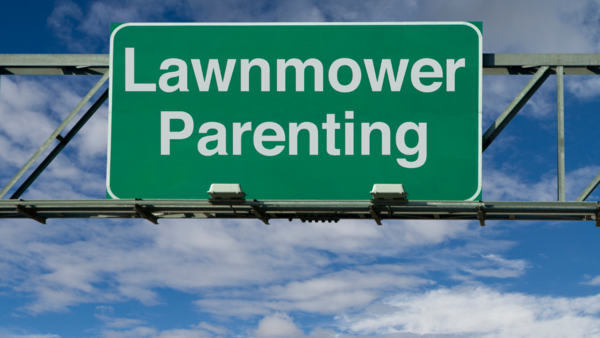Parenting styles have always been a topic of discussion, but one term gaining attention recently is “lawnmower parenting.” It’s a concept that’s changing how we think about preparing kids for life’s challenges. Is it the right way to help children succeed, or could it backfire? But before deciding on this, we need to know the facts about lawnmower parenting. Here is everything you need to know to make an informed decision.
What is lawnmower parenting?
Lawnmower parenting which is also known as “bulldozer parenting,” refers to a style where parents try to remove obstacles or difficulties from their child’s path. Just like a lawnmower clears grass and weeds, these parents aim to smooth out life’s challenges so their kids don’t face discomfort or failure.
For example, a lawnmower parent might:
– Talk to a teacher to excuse a missed deadline.
– Handle disputes with peers on their child’s behalf.
– Solve academic or extracurricular problems instead of letting the child deal with them.
While this might seem like a way to support children, it raises questions about whether kids learn essential life skills when everything is handled for them.
Sometimes, parents may engage in lawnmower parenting unintentionally trying to prevent child from facing challenges and solve problems for them. Signs may include feeling anxious when their child struggles or experiencing discomfort for not being able to help the child even for the minor obstacles, if parents find them overdoing these, it’s time to rethink their parenting approach. It’s crucial for parents to encourage freedom and independence allowing their children to handle age-appropriate challenges and focus on guiding rather than solving problems. Reflecting on intervention habits and stepping back when unnecessary fosters confidence and essential life skills among children.
Dr Sachu Ramalingam, Head of Centre of Well-Being, Lighthouse Learning.

What do parents do to become a lawnmower?
Lawnmower parenting often starts with good intentions. Parents want their kids to be happy, successful, and stress-free. But sometimes, this protective instinct leads to overstepping. Common behaviours include:
- Taking over responsibilities: Parents might complete homework, projects, or tasks for their children.
- Intervening in social conflicts: Instead of encouraging kids to solve disputes with friends, lawnmower parents step in to mediate.
- Shielding kids from failure: These parents may prevent their children from participating in activities where they might fail or struggle.
- Controlling outcomes: They often try to influence teachers, coaches, or employers to ensure favourable results for their children.
While such actions come from a place of love, they can limit a child’s ability to develop problem-solving skills and strength.
In early childhood, some protection is natural and helpful for building a secure foundation. However, as children grow, they need increasing freedom to face setbacks and learn resilience. Overprotectiveness during adolescence and young adulthood is especially harmful, as this is when independence and decision-making are vital. At these stages, lawnmower parenting can lead to rebellion or anxiety, preventing the child from maturing effectively.
Jairam Balakrishnan, CEO of Globeducate India
How is lawnmower parenting connected to a child’s success?
Supportive parenting is crucial for a child’s growth, but does lawnmower parenting guarantee success? Here’s a nuanced look:

In the short run, lawnmower parenting can help children achieve immediate goals. For example, a parent stepping in during a school issue might ensure better marks or less stress.
However, studies suggest that overprotected children struggle with independence and decision-making. According to research published in 2023, children with overly controlling parents were less likely to develop problem-solving skills and emotional resilience.
Kids raised with constant parental intervention may feel pressured to meet high expectations. This can lead to anxiety, reduced self-confidence, and even burnout.
While lawnmower parenting can create a smooth path temporarily, it might hinder a child’s ability to adapt and thrive in adulthood.

Are there other ways of parenting that can also help raise successful children?
Success doesn’t require clearing all obstacles. Many other parenting styles can help children flourish:
1. Authoritative parenting:
This style balances support with boundaries. Parents guide children but allow them to learn from their mistakes. Research publihsed in 2022 shows that authoritative parenting fosters independence, self-confidence, and academic success.
2. Free-range parenting:
Encouraging kids to explore and take age-appropriate risks can teach responsibility and resilience.
3. Attachment parenting:
Building a strong emotional bond helps children feel secure, leading to better emotional regulation and self-esteem.
4. Coaching style parenting:
Instead of solving problems, parents act as mentors, helping kids brainstorm solutions while letting them take the lead.
By blending support with growth opportunities, these styles can prepare children for real-world challenges.

Read also: Are you spoiling your child?
Should parents resort to this method of parenting?
While lawnmower parenting has its merits, it may not be the best approach for every situation. Here’s what parents should consider:
- Offering support when children genuinely need it is important, but stepping back at times helps them build independence.
- Instead of eliminating problems, teach kids how to handle them. This builds resilience and prepares them for adulthood.
- Letting children experience setbacks can teach valuable lessons about perseverance and growth.
- Ask yourself: Is this action helping my child develop skills they’ll need in the future?

How can parents strike the right balance?
If you find yourself leaning toward lawnmower parenting, it’s okay—parenting is a learning process. Here are steps to balance support and independence:
1. Allow your child to take on small challenges on their own, like resolving a disagreement with a friend.
2. Be a safe space where your child can share concerns, but avoid jumping in to fix everything.
3. Show them how to approach difficulties without taking over completely.
4. Praise your child’s hard work and learning process, even if the outcome isn’t perfect.
Parenting isn’t about perfection—it’s about progress. Lawnmower parenting comes from a place of love, but what is more important to remember is that life’s challenges are important teachers. Instead of clearing every obstacle, focus on teaching your child the techniques required to tackle them.







